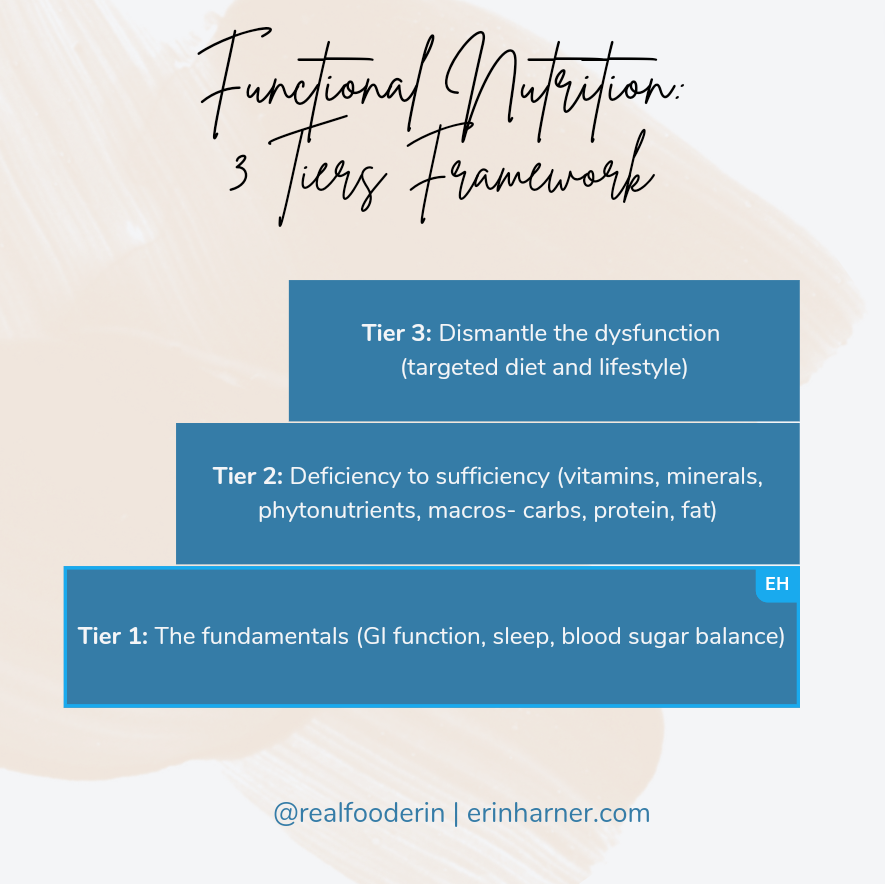Let’s take a deep dive into the diet and lifestyle factors that drain your energy. If you missed the post on Energy- what it is and where it comes from, check that out too.
Energy and functional nutrition
One of the things I love about functional nutrition and functional medicine is that we use frameworks to help guide us, not condition-based protocols. I want to share a framework that will help you understand what’s draining your energy and what to do about it.
In the post Energy- what it is and where it comes from, I talked about the analogy of the tree- the branches, leaves, and trunk are the signs and symptoms. The roots are underground and you can’t see them. They are surrounded by the terrain or the soil. Dysfunction arises from the roots (or root causes), NOT the signs and symptoms.
In functional nutrition, we use the 3 tiers framework to help us address the terrain of the body and the nutrition and lifestyle foundations first, before moving on to specifically address the dysfunction. Here’s an illustration to help explain the tiers as a staircase.

In tier 1 (or at the beginning), I address the foundations. I consider these physiological foundations to be GI function (are you pooping regularly?), blood sugar balance, and sleep. When these are in order, I move on to tier 2. In tier 2, I look at any nutrient deficiencies which could be vitamins, minerals, phytonutrients, or macronutrients (protein, fat, and carbs). If any of these are deficient, we work on diet (what you’re eating and drinking) and may add supplements, if needed, to ensure the body has enough of each nutrient. In tier 3, I work with targeted diet and lifestyle recommendations that address the root causes (genes, digestion, and inflammation), not just the symptoms. Sometimes I’ll refer clients for lab testing in tier 3 to help us gain more understanding of what’s going on in the body.
What does the 3 tiers framework have to do with what’s draining your energy?
Everything. If you skip tiers 1 and 2 and go straight to tier 3, you’re missing the foundations and the reasons your energy may be low in the first place. I’m going to ask some questions for each tier, I encourage you to answer these honestly and take note of your answers.
Tier 1: The fundamentals
GI function: How’s your digestion working? Are you having a bowel movement 1 to 3 times per day most days? Are your BM’s smooth and soft, or are they lumpy or runny? Do you have pain, bloating, or gas during or after meals? How are you doing with eating at least 3 cups of vegetables a day?
Sleep: How’s your sleep? Do you wake up rested and ready to start the day?
Blood sugar balance: Do you notice your blood sugar going up and down throughout the day? Do you get “hangry” or hungry-angry? Do your moods or energy levels fluctuate throughout the day relative to meals and snacks? Do you rely on sugar, coffee, or other foods to pick you up?
Starting at tier 1 is the place to start. If you identified any areas for improvement, start here. In my next post, I’ll walk you through specific strategies you can use to improve each of these areas. For now, choose ONE area to focus on and get to it. I bet you know a few things you can do to improve in each of these areas to help boost your energy quickly!

Tier 2: Deficiency to sufficiency
In order for energy to be produced in the body, certain nutrients need to be present. Let’s go through some of these nutrients that are linked to low energy IF they are deficient.
Vitamins: B-complex vitamins are co-factors in energy production. If your body does not have enough B vitamins (B1 thiamin, B2 riboflavin, B3 niacin, B5 pantothenic acid, B6 pyridoxine, B7 biotin, B9 folate, B12 cobalamins) the Kreb’s cycle that produces ATP in the cells’ mitochondria cannot work properly. Vitamin C is important for turning fat into energy (aka beta-oxidation).
Minerals: Iron, magnesium, zinc, selenium, iodine deficiencies can all lead to low energy. Low iron affects how the body uses energy and also carries oxygen to the muscles and the brain which is critical for mental and physical performance. Magnesium and zinc deficiencies have also been linked to low energy. Selenium is important for both cellular energy production and thyroid function. Iodine is also essential for thyroid function as thyroid hormone is made from iodine. Given that the thyroid gland (in your neck) regulates your metabolism and in turn, energy, having adequate minerals needed for thyroid function is an important part of the energy puzzle.
Macronutrients: Carbohydrates are a primary source for energy production at the cellular level. Extremely low carb diets can lead to low energy, at least in the short-term, until the body can compensate (ie. keto diet). Fats are also sources of energy via a different pathway known as beta-oxidation. Think of carbs as “fast fuel” and fats as “slow fuel”. Protein is a poor energy source and when there are enough carbs and fats, the body doesn’t need to use protein to produce energy.
In the next post, I’ll talk more about specific foods these vitamins, minerals, and macronutrients are found in to ensure you’re getting enough. Note that if you are a plant-based eater, vitamins B12 and iron can be difficult to get enough of from diet alone without any animal based foods, and these are both closely linked to low energy.
Tier 3: Dismantle the dysfunction
When digestion, sleep, and blood sugar balance are in good order and we’ve eliminated any nutrient deficiencies, then we move on to tier 3.
In tier 3 we address the root causes (roots) of the signs and symptoms (branches and leaves) by using targeted diet and lifestyle strategies. We want to alter the terrain (soil) of the body to impact gene expression (aka epigenetics), digestion and absorption, and inflammation.
In this tier, I work with clients often in partnership with their doctors. How is the thyroid working? How are the adrenal glands working? Are there any infections present? What else? Why?
When it comes to energy, here’s a tool you may find helpful to uncover more of the diet and lifestyle factors that are draining your energy:
When you complete the Diet and Lifestyle Wheel, you’ll likely notice that it isn’t round. Which areas are contributing to your low energy?
Action: What is ONE area that is contributing to low energy for you right now? What’s ONE thing you know you can do to help increase your energy today? Now, go do it.

